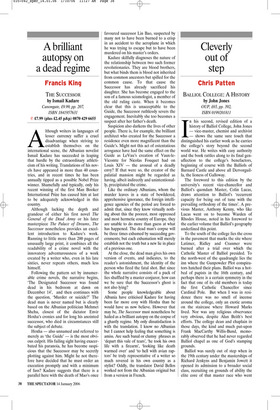A brilliant autopsy on a dead regime
Francis King
THE SUCCESSOR by Ismail Kadare Canongate, £9.99, pp. 207, ISBN 1841957631 ✆ £7.99 (plus £2.45 p&p) 0870 429 6655 Although writers in languages of lesser currency suffer a cruel disadvantage when striving to establish themselves on the international scene, the Albanian novelist Ismail Kadare has succeeded in leaping that hurdle by the extraordinary athleticism of his writing. Translations of his novels have appeared in more than 40 countries, and in recent times he has been annually tipped as a possible Nobel Prize winner. Shamefully and typically, only his recent winning of the first Man Booker International Prize has caused him at last to be adequately acknowledged in this country.
Although lacking the depth and grandeur of either his first novel The General of the Dead Army or his later masterpiece The Palace of Dreams, The Successor nonetheless provides an excellent introduction to Kadare’s work. Running to little more than 200 pages of unusually large print, it combines all the readability of a crime novel with the innovatory adventurousness of a work created by a writer who, even in his late sixties, never repeats others, much less himself.
Following the pattern set by innumerable crime novels, the narrative begins, ‘The Designated Successor was found dead in his bedroom at dawn on December 14’, and then continues with the question, ‘Murder or suicide?’ The dead man is never named but is clearly based on the Albanian politician Mehmet Shehu, closest of the dictator Envir Hoxha’s cronies and for long his anointed successor, who died in circumstances still the subject of debate.
Hoxha — also unnamed and referred to merely as ‘the Guide’ — is the most obvious culprit. His failing sight having exacerbated his paranoia, he has become suspicious that the Successor may be secretly plotting against him. Might he not therefore have decided that he must order an execution promptly and with a minimum of fuss? Kadare suggests that there is a parallel here with the death of Mao’s once favoured successor Lin Bao, suspected by many not to have been burned to a crisp in an accident to the aeroplane in which he was trying to escape but to have been murdered on his master’s orders.
Kadare skilfully diagnoses the nature of the relationship between two such former revolutionaries. They are blood brothers, but what binds them is blood not inherited from common ancestors but spilled for the common cause. To that cause the Successor has already sacrificed his daughter. She has become engaged to the son of a famous seismologist, a member of the old ruling caste. When it becomes clear that this is unacceptable to the Guide, the Successor ruthlessly severs the engagement. Inevitably she too becomes a suspect after her father’s death.
Suspicion also darkens the lives of other people. There is, for example, the brilliant architect who created for the Successor a residence even more magnificent than the Guide’s. Might not this act of ostentatious arrogance have had the same effect on the Guide as LeVau’s creation of Vaux-leVicomte for Nicolas Fouquet had on Louis XIV — the arousal of a deadly envy? If that were so, the creator of the palatial mansion might be regarded as having, albeit indirectly and unintentionally, precipitated the crime.
Like the ordinary Albanians, whom the murder leaves in a state of bewildered, apprehensive ignorance, the foreign intelligence agencies of the period are forced to admit that, since they know virtually nothing about this the poorest, most oppressed and most hermetic country of Europe, they are unable to do more than guess at what has happened. The dead man’s corpse will be three times exhumed by succeeding governments; but each exhumation will merely establish not the truth but a new lie in place of a previous one.
At the close, the dead man gives his own version of events, and indicates, to the reader’s astonishment, the identity of the person who fired the fatal shot. But since the whole narrative consists of a pack of lies shuffled by a master conjuror, how can we be sure that the Successor’s ghost is not also lying?
Some people knowledgeable about Albania have criticised Kadare for having been far more cosy with Hoxha than he would have us now believe. However that may be, The Successor must nonetheless be hailed as a brilliant autopsy on the corpse of a ghastly regime. My only dissatisfaction is with the translation. I know no Albanian but I cannot help feeling that something is amiss. Are such banal or clumsy phrases as ‘depart this vale of tears’, ‘he took his own life with a firearm’, ‘looking like death warmed over’ and ‘to hell with avian raptors’ be truly representative of a writer so much revered in his own country as a stylist? Oddly, the translator David Bellos worked not from the Albanian original but from a version in French.














































 Previous page
Previous page